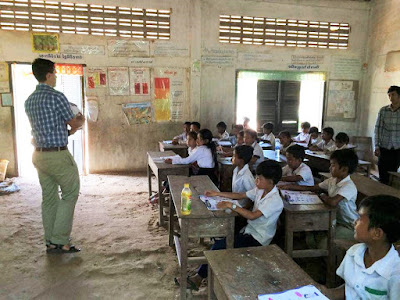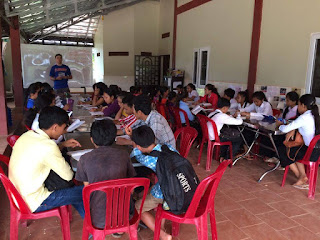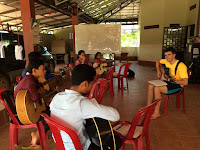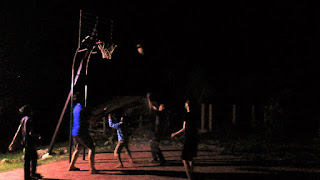Hey, this is Caleb, the Smith’s MTW intern for this Summer.
English classes; where open-ended questions make eye contact with the teacher just about as avoidable as the bubonic plague. Some of you may be wondering, what exactly is the point of missionaries teaching English? There are an immense number of answers, but let me try to put it simply: Learning English in Cambodia is like getting a good business degree in the US. It allows students to pursue further study in college, get good jobs, and support their families. Furthermore, most jobs in Cambodia require seven days of work weekly. On the contrary, jobs received after English or college training often only require five or six, allowing educated workers to invest their free time in serving their local communities and their churches.
Recognizing these benefits, many students, both Christians and Buddhists (the state religion here), are drawn to come and learn English at the Smith’s house from week to week. By means of English education, many in Angk’jeay have become friends of the Smith’s, are prepared for better futures, and have been exposed to and put their faith in Jesus Christ.
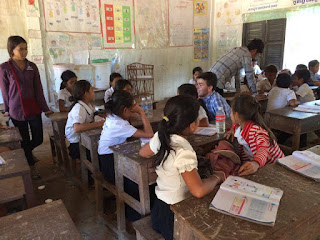 For those of you who haven’t had the chance to teach English as a second language yet, let me paint you a picture: Imagine playing UNO. Now forget that, because it’s is nothing like playing UNO. Teaching English is an attempt to reconcile the differences in pronunciation and cultural connotation that languages have adopted throughout centuries for the sake of attaining common linguistic understanding. Many phrases that are completely casual in one culture may be nonexistent in another. And even more frustratingly, there are sounds that are common to some languages that are completely foreign to others. For example, a couple days ago, I spent a decent amount of time working with students to pronounce the word “year” since the “ee” sound is essentially never used in Khmer. Oppositely, Khmer often uses the “sr” sound with a rolled “r,” which never occurs in English. On the bright side, students have gotten some good laughs out of me trying to pronounce their names.
For those of you who haven’t had the chance to teach English as a second language yet, let me paint you a picture: Imagine playing UNO. Now forget that, because it’s is nothing like playing UNO. Teaching English is an attempt to reconcile the differences in pronunciation and cultural connotation that languages have adopted throughout centuries for the sake of attaining common linguistic understanding. Many phrases that are completely casual in one culture may be nonexistent in another. And even more frustratingly, there are sounds that are common to some languages that are completely foreign to others. For example, a couple days ago, I spent a decent amount of time working with students to pronounce the word “year” since the “ee” sound is essentially never used in Khmer. Oppositely, Khmer often uses the “sr” sound with a rolled “r,” which never occurs in English. On the bright side, students have gotten some good laughs out of me trying to pronounce their names.
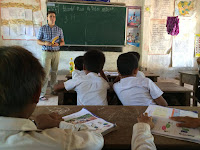 In spite of some difficulty, the classes have been so much fun to teach here. As the son of a math teacher, I’ve grew up getting to see many people experience this whole “learning” thing, and I’m a fan of it. One of my favorite things about teaching, specifically in the public school, is that I’ve been able to try out some of the Khmer phrases I’ve learned. My use of those phrases is similar to Ron Weasley casting spells in The Sorcerer’s Stone. They almost never have the effect I anticipate (blank stares tend to be popular), but when they actually communicate what’s intended, it’s magic.
In spite of some difficulty, the classes have been so much fun to teach here. As the son of a math teacher, I’ve grew up getting to see many people experience this whole “learning” thing, and I’m a fan of it. One of my favorite things about teaching, specifically in the public school, is that I’ve been able to try out some of the Khmer phrases I’ve learned. My use of those phrases is similar to Ron Weasley casting spells in The Sorcerer’s Stone. They almost never have the effect I anticipate (blank stares tend to be popular), but when they actually communicate what’s intended, it’s magic.
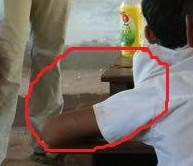 To discuss an experience teaching in the public school, I would like to draw your attention to the picture on the left, which is simply a cropped version of the picture above. Circled in red is a ledge that leads up to the chalkboard. Though proposed to be helpful for student sight and reaching high places on the board, there is a simple downfall of this mechanism (or at least in my use of it). Tuesday morning, I was teaching the numbers from one through ten and had them written on the board. I was randomly pointing at different numbers and the students would respond with the name of the number. Much like The Count from Sesame Street, I think numbers are pretty hype, so I was getting into it. As I swung back from the right side of the board to point at the “1” on the left side, I misplaced my back foot, slipped off the platform and nearly bit the dust about five feet from the classroom door. After regaining my balance (and whatever was left of my dignity) I took a bow, as the students enjoyed a great deal of laughter at my expense. I’m thankful for that moment. Even while being the subject of their amusement, I got to experience the sweet way in which laughter can completely transcend language.
To discuss an experience teaching in the public school, I would like to draw your attention to the picture on the left, which is simply a cropped version of the picture above. Circled in red is a ledge that leads up to the chalkboard. Though proposed to be helpful for student sight and reaching high places on the board, there is a simple downfall of this mechanism (or at least in my use of it). Tuesday morning, I was teaching the numbers from one through ten and had them written on the board. I was randomly pointing at different numbers and the students would respond with the name of the number. Much like The Count from Sesame Street, I think numbers are pretty hype, so I was getting into it. As I swung back from the right side of the board to point at the “1” on the left side, I misplaced my back foot, slipped off the platform and nearly bit the dust about five feet from the classroom door. After regaining my balance (and whatever was left of my dignity) I took a bow, as the students enjoyed a great deal of laughter at my expense. I’m thankful for that moment. Even while being the subject of their amusement, I got to experience the sweet way in which laughter can completely transcend language.
Our hope is that my time teaching at the public school will create an even better relationship between the Smith’s ministry and the public school here. Perhaps some students will consider joining in the classes at the house. I will talk more about the language classes that go on at the Smith’s home in future posts, but this is all I had time for today. Thank you so much for your thoughts, prayers, and support.
In Christ,
Caleb

